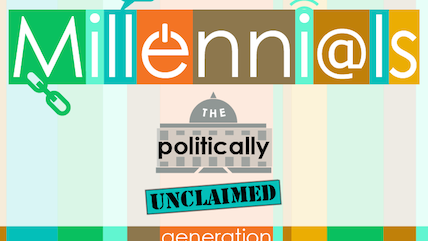Millennial Support for Redistribution and Government Social Spending Declines with Income

Reason-Rupe has a new survey and report out on millennials—find the report here.
Millennials believe that government should help those in need and are divided over income redistribution. However, millennials' support for redistribution and social welfare spending decline as they age, make more money (pay more in taxes), and take on more responsibilities. Here are several findings from a new Reason-Rupe report of millennials:
First, millennials' become more opposed to income redistribution as their income raises. For instance, among those making less than $20,000 a year, 53 percent support reducing income differences while 39 percent oppose. In contrast, once millennials start making $40,000 a year or more, then support flips and instead 54 percent oppose redistribution and 40 percent support. Similarly, those who are employed full-time oppose income redistribution 54 to 40 percent, while the unemployed favor it 51 to 40 percent.
In similar fashion, support for paying higher taxes to increase financial assistance to the poor declines with income and education. Seventy-one percent of those making less than $20,000 a year support raising taxes to increase financial assistance to the poor; this number drops to 47 percent among those making over $60,000 annually. Likewise, two-thirds of those with high school diplomas or less support high taxes to expand the safety net, compared to 50 percent of college graduates.
Intensity of support for government guarantees also declines with income. For instance, 46 percent of millennials making less than $20,000 a year say the government "definitely" should guarantee a living wage, compared to 22 percent among those making more than $60,000 a year.
Second, millennials' support for large government flips once they learn it requires high taxes. When tax rates are not explicit, 54% of millennials favor "larger government providing more services" and 43% prefer "smaller government providing fewer services." But once tax rates are mentioned, support flips. Instead, 57% favor "smaller government, providing fewer services, with low taxes" and 41% want "larger government, providing more services, with high taxes." (Read more here).
Third, as millennials roll off their parents' health insurance plans and begin paying for their own policies, they begin to solidly oppose paying high premiums to provide for the uninsured (39% favor and 59% oppose). However, millennials' whose parents' pay say they favor the idea of paying more to subsidize covered for the uninsured (57% favor, 42% oppose). (Read more here.)
Fourth, when millennials learn they may get back less from Social Security than they contribute, they support changing the program so younger workers can invest their Social Security taxes in private retirement accounts. In fact, a majority (51%) would favor private retirement accounts even if it required reducing benefits to current seniors, while 45 percent would oppose. (Read more here).
These data indicate that as millennials find employment, get promoted, make more money, and pay higher taxes, their support for activist government may recede. The fact that today a third are under- or unemployed and a third are living at home indicates stalled upward mobility, which may in turn bolster support for increased government action.
To learn more about millennials, check out Reason-Rupe's new report.


Show Comments (1)